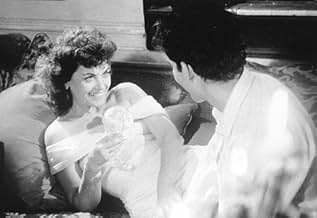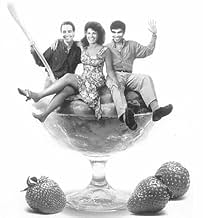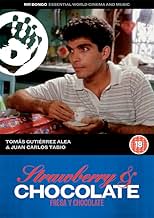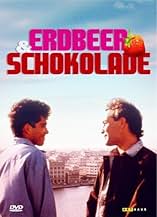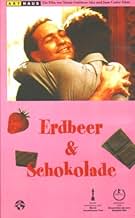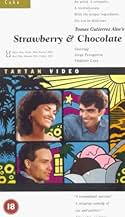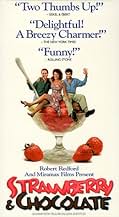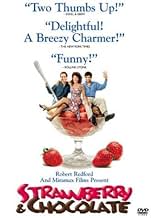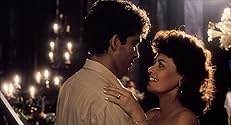IMDb RATING
7.4/10
6.2K
YOUR RATING
Story of two men who are opposites: one gay, the other straight; one a fierce communist, the other a fierce individualist; one suspicious, the other accepting; and how they come to love each... Read allStory of two men who are opposites: one gay, the other straight; one a fierce communist, the other a fierce individualist; one suspicious, the other accepting; and how they come to love each other.Story of two men who are opposites: one gay, the other straight; one a fierce communist, the other a fierce individualist; one suspicious, the other accepting; and how they come to love each other.
- Nominated for 1 Oscar
- 25 wins & 2 nominations total
Featured reviews
This movie is about accepting difference and learning to appreciate other points of view and other ways of life. It's not really a movie about gay men - get over that! It's about friendship, and about the love Cubans feel for their country. Jorge Perugorría is absolutely great in this role, as are all of the other characters. The scenes of Havana are beautiful and heartbreaking. This film conveys what it must feel like for Cubans to leave their country, and how difficult that is. It's also about learning to think for yourself and to have opinions and do things that others might not find "politically correct." There's nothing subversive about this movie, and nothing that you need to hide from the kids. In fact, I recommend that people show the film to their teenagers and talk about it, because it sends such a great message about accepting people as they are. It's also tender and funny, and has just the right balance of humor and drama. Nancy (Mirta Ibarra) is wonderful.
`Strawberry and Chocolate' (1993)is set in contemporary Havana. The luster of that city has dimmed after nearly four decades of Castro's rule. David (Vladimir Cruz), a student and avid Castro supporter, is on the rebound after losing his girlfriend. He had taken her to a cheap hotel to make love, but the place is so shabby it puts her off. Instead, he promises never to touch her until they marry. In the next scene, she marries someone else while David stands sullenly among the well wishers at the registry office. Then he meets Diego (Jorge Perugorría).
Diego, who is flamboyantly gay, parks himself at David's table in an outdoor café to eat a dish of strawberry ice cream. For David, this is suspicious because chocolate is also available. Diego says some people like chocolate, some like strawberry, an innocuous line that gives the movie its title and also hints at the odd couple relationship to follow.
Diego does not disguise his sexual interest in David, but is also interested in giving David an education the regime denies him. The older man is far more cultured than his new friend. Offers of books banned in Castro's Cuba, such as a novel by Mario Vargas Llosa or the poems of John Donne, lure David to his apartment for tea and talk. When David reports that Diego is involved with a forbidden art exhibit, he is directed to befriend Diego to find out more information. `Strawberry and Chocolate' thus sets their emerging friendship against the backdrop of two bleak themes: anti-gay prejudice in the Castro regime, and the betray-thy-neighbor expectation of a police state.
But almost nobody conforms to type. A woman in Diego's building who is part of the neighborhood Vigilance Committee, on the watch for counter-revolutionary activities, turns out to be a good friend to Diego and then to David. Everyone plays one game with the government, but a different one in their private lives. This is a lesson David has to learn. Encounters with women along the way provide a few subplots, but the heart of the story lies in the hearts of the two men.
`Strawberry and Chocolate' is credited to directors Tomás Gutiérrez Alea and Juan Carlos Tabío. The former was, until his death shortly after completing this film, the best known filmmaker in Cuba, winning an international reputation in the 1960's for titles such as `Memoirs of Underdevelopment,' a look at life in Cuba in the early Castro years that tempers criticism with prudence. `Strawberry' is smaller in scale and less overtly political.
The film was nominated for an Oscar in 1995 and won awards at film festivals around the world (including the Sundance Festival). American viewers may instantly slot it with Hollywood features that show how straight characters learn life lessons from a wiser gay companion (`Boys on the Side,' `As Good As It Gets'). And at times Diego's excesses recall the worst performances of Harvey Fierstein. Yet superb performances by the two male leads eventually move beyond stereotypes they and the audience initially share about each other, transforming their unexpected friendship into a statement that puts the lie to official groupthink in a repressive regime.
Diego, who is flamboyantly gay, parks himself at David's table in an outdoor café to eat a dish of strawberry ice cream. For David, this is suspicious because chocolate is also available. Diego says some people like chocolate, some like strawberry, an innocuous line that gives the movie its title and also hints at the odd couple relationship to follow.
Diego does not disguise his sexual interest in David, but is also interested in giving David an education the regime denies him. The older man is far more cultured than his new friend. Offers of books banned in Castro's Cuba, such as a novel by Mario Vargas Llosa or the poems of John Donne, lure David to his apartment for tea and talk. When David reports that Diego is involved with a forbidden art exhibit, he is directed to befriend Diego to find out more information. `Strawberry and Chocolate' thus sets their emerging friendship against the backdrop of two bleak themes: anti-gay prejudice in the Castro regime, and the betray-thy-neighbor expectation of a police state.
But almost nobody conforms to type. A woman in Diego's building who is part of the neighborhood Vigilance Committee, on the watch for counter-revolutionary activities, turns out to be a good friend to Diego and then to David. Everyone plays one game with the government, but a different one in their private lives. This is a lesson David has to learn. Encounters with women along the way provide a few subplots, but the heart of the story lies in the hearts of the two men.
`Strawberry and Chocolate' is credited to directors Tomás Gutiérrez Alea and Juan Carlos Tabío. The former was, until his death shortly after completing this film, the best known filmmaker in Cuba, winning an international reputation in the 1960's for titles such as `Memoirs of Underdevelopment,' a look at life in Cuba in the early Castro years that tempers criticism with prudence. `Strawberry' is smaller in scale and less overtly political.
The film was nominated for an Oscar in 1995 and won awards at film festivals around the world (including the Sundance Festival). American viewers may instantly slot it with Hollywood features that show how straight characters learn life lessons from a wiser gay companion (`Boys on the Side,' `As Good As It Gets'). And at times Diego's excesses recall the worst performances of Harvey Fierstein. Yet superb performances by the two male leads eventually move beyond stereotypes they and the audience initially share about each other, transforming their unexpected friendship into a statement that puts the lie to official groupthink in a repressive regime.
Fresa y chocolate
I liked to watch Fresa y Chocolate; this is first Cuban movie I've seen. Fresa y Chocolate is a product of two directors, Tomás Gutiérrez Alea and Juan Carlos Tabío in 1993. Fresa y Chocolate was nominated in 1995 the best foreign film. During the production of this film the director Alea had cancer and for this reason Tabío had to help him to complete the movie. Later 1996 Alea die. This movie expresses the oppression of Cuban government toward the homosexual and the conflict also the friendship within two different men.
Around 1997 in Cuba,Diego (Jorge Perugorria ) the main character is a cultured gay and David (Vldimir Cruz) a young revolutionary college student. He is a naive and dogmatic. The story begins at a cheap hotel room where David and his sweetheart, Vivian tried to have first intimate experience together but ended up angry at each other, later Vivian marries to a much older man who is in the government office position. David, the wedding day feeling low come to an Ice cream shop near by school and over there David and Diego meet. At the begging, it was Diego's attempt to allure David but soon it change and in spite of their sexuality, these two different men establish a true friendship. Most of story take a place at Diego's apartment where full of things (art work, forbidden books, pictures...) for David's eye. It is a new and different world for David, a dogmatic and in a way an ignorant. Diego tells David about his anguish and problem toward the government. For him being homosexual hinder his work in Cuba and also his well being, too.
However, David learns much about art and literature from Diego and moreover, he learn how to enjoy and savor life. The message of this movie is tolerance. No matter what is one's sexuality people have genuine heart. They have hope, dreams, and frustration that life brings us.
I think this movie is worth to watch because Fresa y Chocolate gave me a chance to give a glance to Cuba, the country that I don't know yet. To me watching a good film lessens a tension of life.
I liked to watch Fresa y Chocolate; this is first Cuban movie I've seen. Fresa y Chocolate is a product of two directors, Tomás Gutiérrez Alea and Juan Carlos Tabío in 1993. Fresa y Chocolate was nominated in 1995 the best foreign film. During the production of this film the director Alea had cancer and for this reason Tabío had to help him to complete the movie. Later 1996 Alea die. This movie expresses the oppression of Cuban government toward the homosexual and the conflict also the friendship within two different men.
Around 1997 in Cuba,Diego (Jorge Perugorria ) the main character is a cultured gay and David (Vldimir Cruz) a young revolutionary college student. He is a naive and dogmatic. The story begins at a cheap hotel room where David and his sweetheart, Vivian tried to have first intimate experience together but ended up angry at each other, later Vivian marries to a much older man who is in the government office position. David, the wedding day feeling low come to an Ice cream shop near by school and over there David and Diego meet. At the begging, it was Diego's attempt to allure David but soon it change and in spite of their sexuality, these two different men establish a true friendship. Most of story take a place at Diego's apartment where full of things (art work, forbidden books, pictures...) for David's eye. It is a new and different world for David, a dogmatic and in a way an ignorant. Diego tells David about his anguish and problem toward the government. For him being homosexual hinder his work in Cuba and also his well being, too.
However, David learns much about art and literature from Diego and moreover, he learn how to enjoy and savor life. The message of this movie is tolerance. No matter what is one's sexuality people have genuine heart. They have hope, dreams, and frustration that life brings us.
I think this movie is worth to watch because Fresa y Chocolate gave me a chance to give a glance to Cuba, the country that I don't know yet. To me watching a good film lessens a tension of life.
This film isn't just an "odd couple" story, as it can appear at a first glance. This is a landmark Cuban film about the plight of homosexual artists in Communist Cuba. Being homosexual in Cuba in the 60's and 70's, maybe even the 80's, could mean incarceration or being sent to "colonies", often hard labour camps. What makes this film extraordinary is that it was made by a Cuban director who had been himself part of the Communist intelligenzia at the beginning, but could still be objective and therefore critical of the intolerance of real socialism. What also makes the film extraordinary is that the film itself was a box office success in Cuba and helped change attitudes towards homosexuality. Tomás Gutiérrez Alea, or Titón, as he was known in Cuba, is the greatest and best loved Cuban filmmaker, with a trademark black humour, best exemplified in his outstanding films Memorias del subdesarrollo (Memories of Underdevelopment) (1968) and La Muerte de un burócrata (Death of a Bureaucrat) (1966). His last film, Guantanamera (1994), which he made when ill with cancer, is a black comedy of "funeral" errors and criticism of Cuban bureaucracy. This is his legacy, the way he wanted his public to remember him, laughing at death.
A beautiful movie for the heart. One of the most wonderful stories of friendship ever told.
Jorge Perugorría as Diego is amazing. (I'd well like to see some of his other work.) It is most astonishing to see how his character develops from the limp-wristed cliché gay at the beginning to a fascinating man who gets in conflict with the regime because he is different on every level from what the system requires him to be: he is an independent spirit, a person with a genuine love for the arts, for literature, for music, he is disappointed by communist ideals - and he is also gay, by the way.
Vladimir Cruz is also very fine as the young and naive David who discovers things through his friendship with Diego he'd never ever thought of: like discovering the beauty of things, of life, of poetry and music... And also being committed to another person, even though this person may seem very 'different' from oneself at first glance.
The development of David's and Diego's friendship is fascinating (I wouldn't interpret anything more into it, not even in the final scene). This is also a "coming of age" tale, in a way: by his friendship with Diego, David begins to think, develops a maturity of spirit - and is also, at last, able to develop a loving and mature relationship with a woman. It is very sweet when he tells Diego: "No-one will hurt her. She is with me."
A true gem of a film. I recommend it to everyone.
Jorge Perugorría as Diego is amazing. (I'd well like to see some of his other work.) It is most astonishing to see how his character develops from the limp-wristed cliché gay at the beginning to a fascinating man who gets in conflict with the regime because he is different on every level from what the system requires him to be: he is an independent spirit, a person with a genuine love for the arts, for literature, for music, he is disappointed by communist ideals - and he is also gay, by the way.
Vladimir Cruz is also very fine as the young and naive David who discovers things through his friendship with Diego he'd never ever thought of: like discovering the beauty of things, of life, of poetry and music... And also being committed to another person, even though this person may seem very 'different' from oneself at first glance.
The development of David's and Diego's friendship is fascinating (I wouldn't interpret anything more into it, not even in the final scene). This is also a "coming of age" tale, in a way: by his friendship with Diego, David begins to think, develops a maturity of spirit - and is also, at last, able to develop a loving and mature relationship with a woman. It is very sweet when he tells Diego: "No-one will hurt her. She is with me."
A true gem of a film. I recommend it to everyone.
Did you know
- TriviaCuba's official submission to the Best Foreign Language Film category for the 67th Academy Awards. As of 2020, it remains the only Cuban film to be nominated for an Oscar.
- GoofsThe blue Cadillac seen at the end of the film was not made until the 1987 model year.
- How long is Strawberry & Chocolate?Powered by Alexa
Details
Box office
- Gross US & Canada
- $2,080,805
- Gross worldwide
- $2,087,569
- Runtime1 hour 48 minutes
- Color
- Sound mix
- Aspect ratio
- 1.85 : 1
Contribute to this page
Suggest an edit or add missing content


